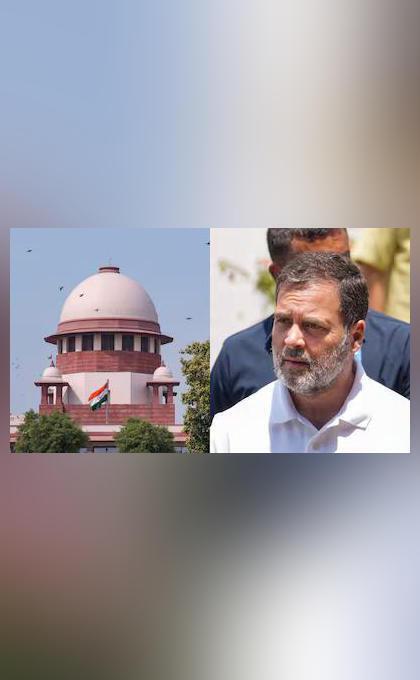
Why Ask on Social Media & Not in Parliament: SC to Rahul on ‘Land Grab’ Claim
The Supreme Court of India has once again taken a stern view of Congress leader Rahul Gandhi’s reckless statements on social media, this time over his claim that China had grabbed 2,000 square kilometers of Indian land. The apex court has rebuked Rahul, asking him why he makes such allegations on social media instead of asking questions in Parliament, where he has the opportunity to seek answers from the government.
The court’s rebuke came while staying a defamation case against Rahul for his remarks about the Indian Army in 2020. The next hearing in the case is scheduled for three weeks later.
Rahul Gandhi’s claim about China grabbing Indian land was made in 2020, during a parliamentary debate on the China-India border dispute. He had said that China had occupied 2,000 square kilometers of Indian land, which led to a huge controversy and sparked off a national debate.
However, the Supreme Court has now taken a dim view of Rahul’s claim, asking him how he knows that 2,000 square kilometers of Indian land was occupied by China. The court has also questioned the fact that Rahul made the claim on social media, instead of asking questions in Parliament, where he could have sought clarification from the government.
The court’s rebuke is a significant development, as it highlights the importance of responsible journalism and the need for politicians to verify facts before making public statements. Rahul’s claim about China grabbing Indian land was widely reported in the media, and it sparked off a huge controversy, which could have led to unnecessary tensions between India and China.
The Supreme Court’s decision to stay the defamation case against Rahul has also sparked off a debate about the limits of free speech. While Rahul has a right to express his opinions, he also has a duty to verify facts before making public statements. The court’s decision to stay the defamation case implies that Rahul’s claim about China grabbing Indian land was not defamatory, but it also sends a strong message to politicians and journalists to be responsible in their reporting and public statements.
The Supreme Court’s rebuke of Rahul comes at a time when there is growing concern about the spread of misinformation and disinformation on social media. The court’s decision highlights the need for politicians and journalists to verify facts before making public statements, and to avoid spreading misinformation.
In recent years, social media has become a major platform for politicians and journalists to express their opinions and share information. However, social media platforms are also vulnerable to misinformation and disinformation, which can have serious consequences. The spread of misinformation on social media can lead to unnecessary tensions and conflicts, and it can also undermine public trust in institutions and leaders.
In the context of Rahul’s claim about China grabbing Indian land, the Supreme Court’s rebuke highlights the importance of verifying facts before making public statements. Rahul’s claim was widely reported in the media, and it sparked off a huge controversy, which could have led to unnecessary tensions between India and China. The court’s decision to stay the defamation case against Rahul implies that his claim was not defamatory, but it also sends a strong message to politicians and journalists to be responsible in their reporting and public statements.
The Supreme Court’s decision also highlights the need for politicians and journalists to respect the limits of their knowledge and expertise. Rahul Gandhi is a well-known politician and leader of the Congress party, but he is not an expert on international relations or geopolitics. His claim about China grabbing Indian land was made without any evidence or credible sources, and it was widely criticized by experts and analysts.
In conclusion, the Supreme Court’s rebuke of Rahul Gandhi over his claim about China grabbing Indian land is a significant development that highlights the importance of responsible journalism and the need for politicians to verify facts before making public statements. The court’s decision sends a strong message to politicians and journalists to be responsible in their reporting and public statements, and to avoid spreading misinformation.
As the world becomes increasingly interconnected and complex, it is essential for politicians and journalists to be responsible and credible in their reporting and public statements. The spread of misinformation and disinformation on social media can have serious consequences, and it is essential for politicians and journalists to verify facts before making public statements.
Sources:






